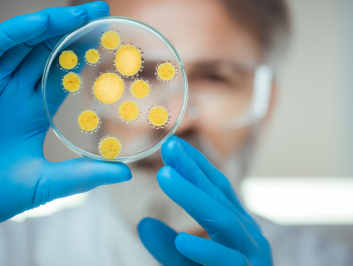Because new and potentially lethal infections continually evolve, infectious disease, a subspecialty of EVMS Department of Medicine, is a diverse and ever changing field.
According to the National Institutes of Health, infectious diseases kill more people worldwide than any other single cause. Fortunately, this isn't the case in the United States, largely because of the quality and availability of our medical care.
What are infectious diseases?
Infectious diseases are caused by germs, which are divided into four groups:
- Bacteria, such as staph and strep
- Viruses, which include human immunodeficiency virus (HIV)
- Fungi, primitive plants, like mushrooms or mildew, such as aspergillis, yeast and mold
- Parasites, which are one-celled animals that use other living things for food and a place to live, such as amoebae or amebiasis
How are we exposed to germs?
Germs exist everywhere in the environment and cause infections through contact, such as touching, eating, drinking or even breathing. Insect and animal bites, as well as social contact, like kissing and sexual contact, can also spread germs.

.png)
.png)



